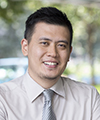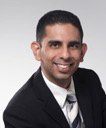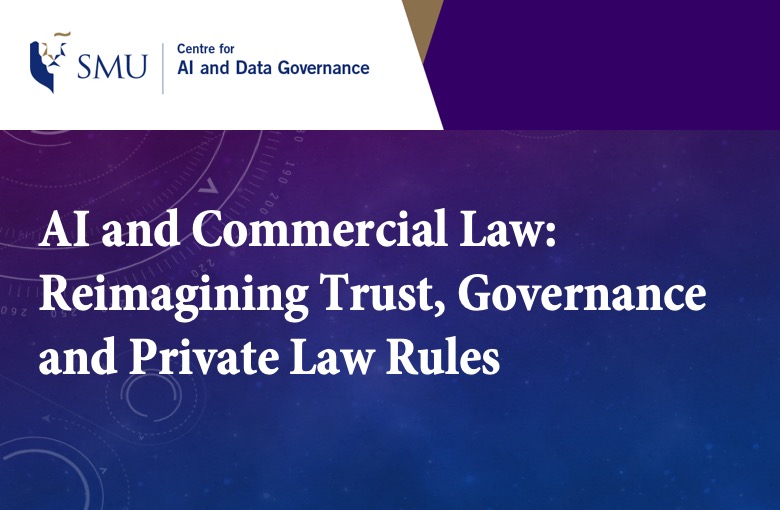Session 5: AI and Tort Law
Session Chair
|

Rajesh Sreenivasan
Head of Technology, Media & Telecommunications
Rajah & Tann Singapore LLP
|
|
Rajesh Sreenivasan heads the TMT Practice at Rajah & Tann and has been advising clients on matters relating to technology, cybersecurity, data protection, telecommunications, electronic commerce, cloud computing, digital forensics and social media for over twenty years.
His clients include state governments and multinational corporations in the telecommunications, social media, computer hardware and software sectors, government linked companies and statutory boards. On the regional front, Rajesh has been engaged by the ASEAN Secretariat to facilitate a pan-ASEAN forum on legislative and regulatory reforms to collectively address convergence of IT, telecoms and broadcasting across all 10 members countries and by the Commonwealth Secretariat to co-lead an e-government capacity building exercise involving all member Caribbean nations. Rajesh has also been engaged by the World Bank and the United Nations on numerous mandates including on digital identity policy and regulations in countries as diverse as Nigeria, Guinea and Ivory Coast. Rajesh is also the contributing author for the Singapore Chapter of Sweet & Maxwell’s Data Protection Laws of the World since 2010. On the corporate front, he sits on the Board of MediaCorp, Singapore’s national broadcaster. He has been unanimously cited as an industry leading lawyer in the TMT sector in Singapore by all major legal ranking agencies for over 2 decades. In 2018, he co-founded Rajah & Tann Technologies Pte Ltd, the corporate arm of Rajah & Tann Asia that provides market leading tech-enabled legal solutions to clients.
Rajesh is unanimously named as a Leading Lawyer for TMT in publications such as Chambers Asia Pacific and The Legal 500 Asia Pacific since 2008. According to Chambers Asia Pacific (2018), Rajesh is “highly prized by multinational technology companies for his expertise in data protection, telecoms regulation and cybersecurity.” He has been further recognised as a Market-leading lawyer for IT, Telco & Media by Asialaw Profiles (2019).
Rajesh was first recognised by Best Lawyers in Singapore in 2008, and has been consistently regarded by his peers through to the 2019 edition. He has been named the 2019 “Lawyer of the Year” for Information Technology Law in Singapore by the same publication as well.
Rajesh has also been ranked as one of the world’s leading practitioners for Data in Who’s Who Legal (2019) and listed as a leading lawyer in International Who’s Who of Telecommunications Lawyers by Global Competition Review and the International Financial Law Review IT and Telecoms Survey. An international panel of lawyers selected Rajesh to be listed in the Guide to the World’s Leading Technology, Media and Telecoms Lawyers, a Euromoney Legal expert guides publication. He has been cited in the Top 10 Standout Legal Sector Innovators List by Financial Times’ 2018 Asia Pacific Innovative Lawyers report.
|
Speakers
“Defamation by Automated Speech: From Strict Liability to Reasonable Diligence”
Synopsis
This is the true power of machine: the ability to think and speak its own mind. Yet when this this has become reality, who should bear the responsibility for the defamatory content uttered? The machine or the master mind behind it? The rise of algorithmic generated content by search engines has posed pressing problems to the legal debate of defamation, and has prompted us to re-consider the basis of liability of defamation law in this era of artificial intelligence.
The common law debate on search engines’ liability in defamation for hyperlinks, automatically produced results, predictions and suggestions has been dominated by the issue of whether search engines are primary or secondary publishers. Orthodox common law is strict in liability for anyone who has participated in publication. The defence of innocent disseminator is available only to secondary publishers due to their lack of knowledge and control of the publication process. In the past decade, there were numerous defamation lawsuits against Google as a search engine. The well-rehearsed defence from Google is that the search results, predictions and suggestions are generated by algorithm. There is no mental element and no human input involved. The quest for search engines’ liability in defamation action has captured the empowering yet ambivalent role of algorithm in information society. An analysis of relevant judgments reveals that judges have been stretching the common law rules to impose or not to impose liability on Google. Interestingly, a study of legal cases also shows that judges are often torn between their sympathy to search engines as indispensable tools to modern life and their duty to apply legal doctrines faithfully.
In analysing cases in Hong Kong, New Zealand, Australia, and other jurisdictions on search engine’s liability in defamation lawsuits, this paper argues that the common law approach on identifying a publisher’s duty is hardly adequate. A search engine, like Google, is neither entirely active nor entirely passive, but rather interactive as a search engine. Rather than fixated on the role of search engines as publishers, we should bear in mind that the rationale behind defamation law is to regulate the injury that one has inflicted on another, and to strike the right balance between reputation protection and freedom of expression. Other than examining the issue from a doctrinal approach, this paper will study the policy behind. It argues that the law has to adapt to the digital landscape.
Speaker
|

Anne SY Cheung
Professor
The University of Hong Kong
|
|
Professor Anne S.Y. Cheung received her legal education at The University of Hong Kong (LL.B), The University of Toronto (J.D.), University of London (LL.M) and Stanford University (JSD). She teaches Law and Society and Media Law. Her research interests are in freedom of expression, privacy, children’s rights (including cyberbullying and domestic violence), and law and society studies. In 2008, she received the Outstanding Young Researcher Award by the University of Hong Kong.
She is a committee member of the Hong Kong Press Council and she is one of the principal investigators of the CLIC Project (Community Legal Information Centre, www.hkclic.org) and Youth Clic (youth.clic.org.hk). She and her team are currently building a website for seniors in Hong Kong. She worked on the Open Net Initiative (Asia) Project to study online freedom of speech in the form of blogging in China. Currently, she is working with Privacy International (UK) to study privacy protection in Hong Kong and China, and working with Media Alternative (the Philippines) to study eGovernance in Hong Kong and Asia. |
“AI in Medical Services and Tort Law”
Synopsis
The AI healthcare market is significant and likely to expand rapidly. AI is increasingly utilised in the provision of medical services to diagnose diseases, to treat illnesses and perform surgery and even in some cases to communicate with patients about their health conditions. There is growing evidence that AI can outperform human doctors in diagnoses. Nonetheless, AI is not immune from errors.
This paper discusses the potential legal liabilities of doctors and hospitals (and/or the AI developers) arising from the use of AI in medical services provision. This core issue impacts on private law rules particularly those relating to the standard of care expected of medical practitioners in the tort of negligence in the utilisation of AI. To what extent can medical doctors understand, evaluate or rely on AI? The focus will be on the common law tort rules in Singapore and Malaysia and civil law tort rules in China. The rules will be examined in light of competing considerations such as economic efficiency, the promotion of technological innovations, the relevance of ethical guidelines applicable to the medical profession and patient welfare.
Speaker
|

Gary Chan
Professor and Associate Dean (Research)
SMU School of Law
|
|
Gary Chan is Professor of Law and Associate Dean (Faculty and Research), School of Law, Singapore Management University. He graduated with degrees in Law and Philosophy. He is an Advocate and Solicitor of the Singapore Supreme Court and an Attorney & Counselor-at-law (New York). His main research interests are Tort Law, the Singapore Legal System and Ethics including ethics in relation to artificial intelligence and medicine. He is the co-author of The Law of Torts in Singapore (Academy Publishing) and is also a member of the Editorial Board of Torts Law Journal. Gary Chan was appointed amicus curiae to provide opinions on tort law and appeared before the Singapore Court of Appeal in 2018 and 2019.
|
“Regulating Autonomous Vehicles: Liability Paradigms and Value Choices”
Synopsis
Automated systems of the next decade promise discernibly greater efficiencies, safety, and productivity. In the context of ground transportation, fully autonomous vehicles are already a technological possibility, only awaiting mainstream deployment. The critical obstacle impeding that deployment is the conundrum over electing the appropriate regulatory regime: existing road traffic laws are not simply transposable as a human driver is no longer in the equation; evidential difficulties arise when one applies existing negligence principles to the cutting-edge hardware and software that power autonomous vehicles; evidential difficulties also arise when one attempts to prove a defect in the said software and hardware when invoking product liability as currently understood. Further, the regulation of autonomous vehicles has tremendous implications for intellectual property law, data protection, and the insurance industry, making the endeavour an even more complex puzzle. This paper considers and compares the experience of various Asia Pacific jurisdictions (Singapore, Australia, and New Zealand) which are at different stages of their regulatory efforts regarding autonomous vehicles (New Zealand has taken a more light-touch, but clearly egalitarian approach; Australia is likely to adopt a more codified approach; while Singapore has not indicated any concrete preference). It also uses the UK (which has taken a somewhat radical, compensation-centric approach) and EU (which has essentially adopted a strict form of product liability paradigm) as markers for comparison. In the final analysis, it may well be down to what each society values the most when electing a liability paradigm to take things forward – be it negligence, product liability/strict liability, no-questions-asked liability, or something new altogether.
Speaker
|

Chen Siyuan
Associate Professor
SMU School of Law
|
|
Chen Siyuan teaches the Law of Evidence in SMU and also directs the school's International Moots Programme which has seen considerable success in all major international competitions. He has published in leading peer-reviewed journals in his field such as the Civil Justice Quarterly and International Journal of Evidence & Proof. His text, The Law of Evidence in Singapore, has been cited on numerous occasions by the Singapore courts. He enjoys capturing aerial panoramas with his drones when he is overseas. |
Commentators
|

Josh Lee Kok Thong
Legal Policy Manager (AI Governance)
Infocomm Media Development Authority of Singapore
|
|
Josh presently works as a Legal Policy Manager for Artificial Intelligence (AI) Governance in the Info-Communications Development Authority of Singapore, where he helps to manage Singapore’s national AI ethics and governance initiatives. Prior to this, Josh was an Assistant Director of the Legal Policy Division in Singapore’s Ministry of Law, and practiced as an international arbitration lawyer in Lee & Lee. He is also registered as an Advocate and Solicitor of the Supreme Court of Singapore.
Josh is deeply passionate in issues at the intersection of law, policy and technology, and finds a deep sense of purpose and fulfilment in working for the greater good and making sense of the future. To these ends, Josh is chairs the Steering Committee of the Asia-Pacific Legal Innovation and Technology Association (https://alita.legal), which is the premier pan-regional platform consolidating legal innovation and technology initiatives in the region. Josh also co-founded and writes on LawTech.Asia (https://.lawtech.asia), Asia’s online publication that aims to drive thought leadership on law and technology in the region. In addition, Josh is the co-Chief Editor for the State of Legal Innovation in Asia-Pacific Report 2019, an authoritative industry reference on legal innovation in the Asia Pacific released at Stanford University’s FutureLaw 2019 Conference.
For his efforts in the legal technology industry, he has been identified by Asia Law Portal as one of Asia’s Top 30 Persons to Watch in the business of law in 2019.
In addition, Josh is also a part of the Singapore Academy of Law’s Law Reform Working Committee on Robotics and AI. Given his keen interest in new technologies such as AI and its potential impacts on society and governance, Josh has also been appointed as a Research Fellow for SMU’s Centre for AI and Data Governance. Josh is also a committee member of the Singapore Academy of Law’s Young Members’ Chapter, which oversees initiatives for the training and welfare of young lawyers.
|
|

Rakesh Kirpalani
Director (Dispute Resolution and Information Technology) and Chief Technology Officer)
Drew & Napier LLC
|
|
Rakesh specialises in commercial dispute resolution and litigation, in particular shareholders’ and directors’ disputes, economic torts, employment disputes, disputes concerning breaches of confidentiality and disputes concerning technology and electronic evidence. He also advises on cyber and digital business issues including cloud computing contracts as well as compliance with technology regulations and cybersecurity.
In particular, he has substantial experience in dealing with issues concerning technology and electronic evidence and extensive skills and knowledge in the information technology field. With his legal and technical knowledge, Rakesh manages the interface between legal and technical issues for clients and simplifies these issues for judges and arbitrators alike.
Some of the cases Rakesh has worked on include:-
- Lead counsel in a 2017 ICC arbitration in London in a claim by a Chinese state-owned entity against an African counterparty for dispute over a seismic data acquisition contract.
- Represented a group of investment companies in an arbitration brought by its information technologies contractor over the failed deployment of its IT systems in a failed joint venture project.
- Advised an acted for a company listed on the Singapore Exchange on a dispute with its technology service provider concerning migration issues to a new platform.
|









